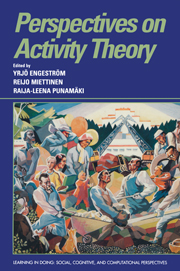Book contents
- Frontmatter
- Contents
- List of contributors
- Series foreword
- Introduction
- Part I Theoretical issues
- 1 Activity theory and individual and social transformation
- 2 The content and unsolved problems of activity theory
- 3 Knowledge as shared procedures
- 4 Activity theory in a new era
- 5 Society versus context in individual development: Does theory make a difference?
- 6 Cultural psychology: Some general principles and a concrete example
- 7 Laws, logics, and human activity
- 8 Collapse, creation, and continuity in Europe: How do people change?
- 9 Activity theory and the concept of integrative levels
- 10 The relevance to psychology of Antonio Gramsci's ideas on activity and common sense
- Part II Language and its acquisition
- Part III Play, learning, and instruction
- Part IV Technology and work
- Part V Therapy and addiction
- Author index
- Subject index
10 - The relevance to psychology of Antonio Gramsci's ideas on activity and common sense
Published online by Cambridge University Press: 05 June 2012
- Frontmatter
- Contents
- List of contributors
- Series foreword
- Introduction
- Part I Theoretical issues
- 1 Activity theory and individual and social transformation
- 2 The content and unsolved problems of activity theory
- 3 Knowledge as shared procedures
- 4 Activity theory in a new era
- 5 Society versus context in individual development: Does theory make a difference?
- 6 Cultural psychology: Some general principles and a concrete example
- 7 Laws, logics, and human activity
- 8 Collapse, creation, and continuity in Europe: How do people change?
- 9 Activity theory and the concept of integrative levels
- 10 The relevance to psychology of Antonio Gramsci's ideas on activity and common sense
- Part II Language and its acquisition
- Part III Play, learning, and instruction
- Part IV Technology and work
- Part V Therapy and addiction
- Author index
- Subject index
Summary
Le bon sens est la chose du monde la mieux partagée.
DescartesIntroduction
Common sense is a key concept in the study of man. Its relevance has been further underlined by recent social transformations and political events. Take, for example, the role it played in the collapse of the Communist regimes in Eastern Europe and the breakup of the partitocracy in Italy. In general, common sense orientates and at the same time is the product of activity, a process that includes communication, cooperation, conflict, and negotiation.
Although Gramsci's ideas on common sense are in the tradition of Enlightenment thought, some aspects are remarkably modern and useful in current psychological research. They link up with the problem of social representations, which is now crucial in social cognitive psychology. Furthermore, these ideas are founded on the Marxist concepts of praxis and historicity, which are in important respects in line with the cultural-historical school founded by the Russian psychologist Vygotsky and, hence, with the concept of activity as developed by this psychological school.
I have chosen to concentrate here on Gramsci's ideas in order to help psychologists, well versed in their own fields of research, in making their own observations on the problems put forward. The underlying assumption is that these ideas can serve as a basis for a comparison of different psychological theories, above all between cognitive social psychology and activity theory, and thus contribute to the advance of psychology.
- Type
- Chapter
- Information
- Perspectives on Activity Theory , pp. 147 - 162Publisher: Cambridge University PressPrint publication year: 1999
- 10
- Cited by

